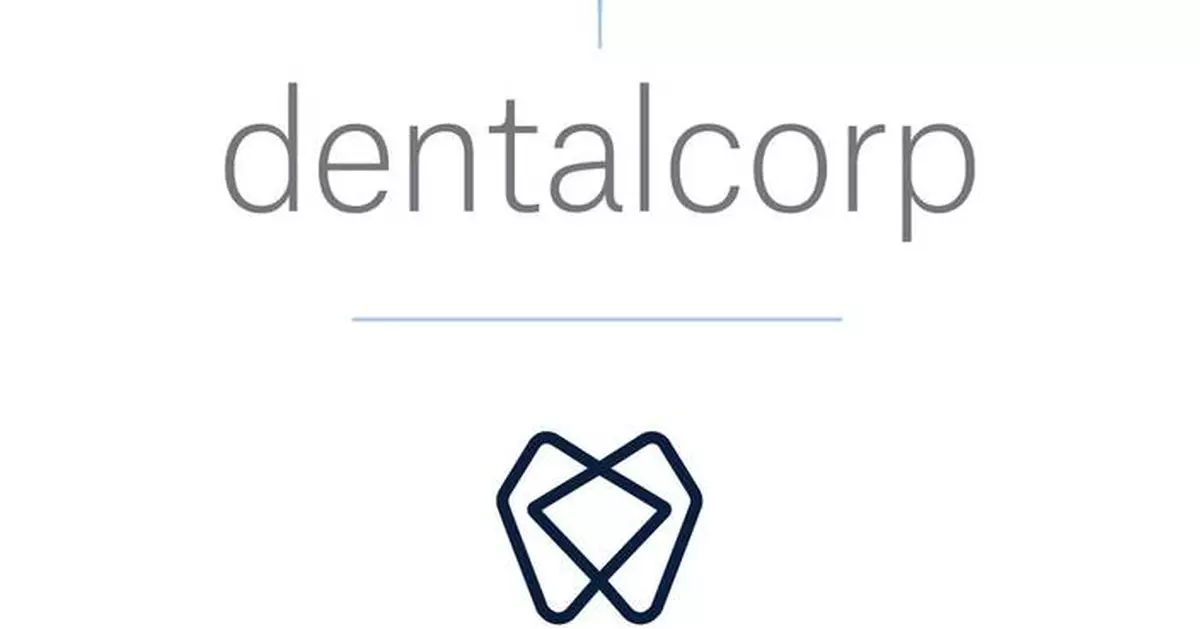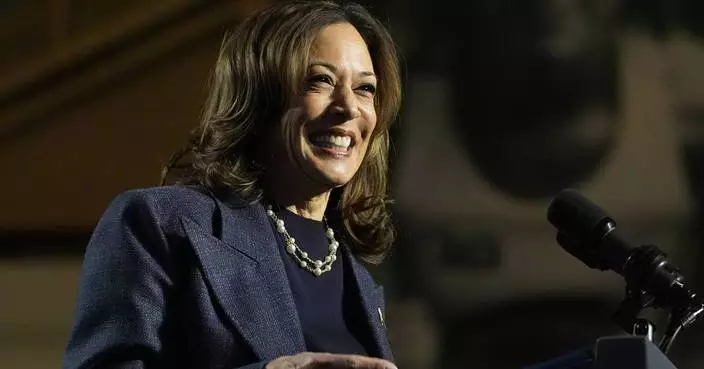BOSTON & TORONTO--(BUSINESS WIRE)--Nov 4, 2024--
Dentalcorp Holdings Ltd. (“Dentalcorp” or the “Company”) (TSX: DNTL) and VideaHealth, Inc. (“VideaHealth”), a leader in dental AI solutions, today announced a strategic partnership that will allow Dentalcorp to deploy artificial intelligence technology to advance patient care across its nationwide network of dental practices. This partnership marks a notable milestone in Dentalcorp's long-term growth agenda and is expected to allow the Company to set new benchmarks for clinical excellence and operational efficiency across its network.
This press release features multimedia. View the full release here: https://www.businesswire.com/news/home/20241104133311/en/
By integrating VideaHealth’s AI-powered technology into Dentalcorp’s existing suite of digital solutions, Dentalcorp expects to realize the following benefits across its network:
“We have always been committed to providing our practices with best-in-class technology to support superior patient care. We believe that our partnership with VideaHealth represents a significant step forward in our ongoing efforts to transform our network. By leveraging AI, we expect to not just improve diagnostics, but enhance the entire patient experience and support our practitioners in delivering the highest standard of care,” said Graham Rosenberg, Founder and CEO of Dentalcorp.
Dentalcorp’s decision to partner with VideaHealth follows an extensive pilot program where a select group of Dentalcorp practices rigorously evaluated various AI solutions across a number of clinical, operational, financial and regulatory factors. VideaHealth’s advanced AI capabilities, robust data protection measures and established industry relationships, contributed to their impressive performance across every dimension during this pilot program and made them the ideal partner for this next phase of Dentalcorp’s growth plan.
“We are thrilled to partner with Dentalcorp, a leader in the Canadian dental industry. Our shared vision of leveraging technology to improve oral health aligns perfectly. By combining Dentalcorp's extensive network and commitment to excellence with our AI expertise, we will be setting a new standard for dental care in Canada and beyond,” said Florian Hillen, CEO and Founder of VideaHealth.
About Dentalcorp
Dentalcorp is Canada’s largest and one of North America’s fastest growing networks of dental practices, committed to advancing the overall well-being of Canadians by delivering the best clinical outcomes and leading experiences. Dentalcorp acquires leading dental practices, uniting its network in a common goal: to be Canada’s most trusted healthcare network. Leveraging its industry-leading technology, know-how and scale, Dentalcorp offers professionals the opportunity to retain their clinical autonomy while unlocking their potential for future growth. To learn more, visit Dentalcorp.ca.
About VideaHealth
VideaHealth is at the forefront of bringing AI to dentistry, partnering with dental professionals to improve patient care, strengthen patient relationships, and drive practice growth. VideaHealth's AI-powered platform is used by dental professionals across North America to analyze millions of patients annually, supporting clinicians in identifying and treating critical dental conditions. Headquartered in Boston and backed by leading venture capital firms, VideaHealth is committed to transforming dental care through innovative AI solutions. For more information, visit videa.ai.
Forward-Looking Statements
This press release contains forward-looking statements regarding Dentalcorp's business operations and strategy. Forward-looking information includes, but is not limited to, statements about the Company’s beliefs, plans, expectations, anticipations, estimates, or intentions. Forward-looking information includes words like could, expect, may, anticipate, assume, believe, intend, estimate, plan, project, guidance, outlook, target, and similar expressions suggesting future outcomes or events. The forward-looking information in this news release includes, but is not limited to, implementation of the VideaHealth Platform across Dentalcorp’s network and our expectations regarding the impact and benefits thereof. Readers are cautioned that actual results may vary materially from those described above. Forward-looking statements are necessarily based upon management’s perceptions of historical trends, current conditions and expected future developments, as well as a number of specific factors and assumptions that, while considered reasonable by management as of the date on which the statements are made, are inherently subject to significant business, economic and competitive uncertainties and contingencies which could result in actions, events, conditions, results, performance or achievements to be materially different from those projected in the forward-looking statements.
Actual results may differ materially from those anticipated in the forward-looking information as a result of known and unknown risk factors, many of which are beyond the control of the Company. Such risks include, but are not limited to, the factors described in “Risk Factors” in our AIF and MD&A. Accordingly, we warn readers to exercise caution when considering statements containing forward-looking information and caution them that it would be unreasonable to rely on such statements as creating legal rights regarding the Company’s future results or plans. We are under no obligation (and we expressly disclaim any such obligation) to update or alter any statements containing forward-looking information or the factors or assumptions underlying them, whether as a result of new information, future events, or otherwise, except as required by applicable securities laws. All of the forward-looking information in this news release is qualified by the cautionary statements herein.


Dentalcorp Selects VideaHealth as Dental AI Partner to Enhance Patient Care and Operational Efficiency across Nationwide Network of Dental Practices (Graphic: Business Wire)
SEATTLE (AP) — Unionized factory workers at Boeing were voting Monday whether to accept a contract offer or to extend their strike, which has lasted more than seven weeks and shut down production of most Boeing passenger planes.
A vote to ratify the contract on the eve of Election Day would clear the way for a major U.S. manufacturer and government contractor to resume airplane production. If members of the International Association of Machinists and Aerospace Workers vote for a third time to reject Boeing's offer, it would plunge the aerospace giant into further financial peril and uncertainty.
In its latest proposed contract, Boeing is offering pay raises of 38% over four years plus ratification and productivity bonuses. IAM District 751, which represents Boeing workers in the Pacific Northwest, endorsed the proposal, which is slightly more generous than one the machinists voted down nearly two weeks ago.
Union officials said they achieved all they could though bargaining and the strike, and that if the current proposal is rejected, future offers from Boeing might be worse. They expect to announce the result of the vote late Monday.
Boeing says average annual pay for machinists is $75,608 and would rise to $119,309 in four years under the current offer.
Pensions were a key issue for workers who rejected the company's previous offers in September and October. In its new offer, Boeing did not meet their demand to restore a pension plan that was frozen nearly a decade ago.
If machinists ratify the contract now on the table, they would return to work by Nov. 12, according to the union.
The workers got their last paychecks in mid-September, a few days after the strike started, and are likely facing more pressure on their personal financial well-being.
Bernadeth Jimenez, who has worked in quality assurance at the Boeing plant in Everett, Washington, since 2022, said she voted “yes” on Monday after voting against previous company offers. She was satisfied with the proposed wage increases, and said she never expected a pension anyway — she's putting money in a 401(k) plan.
“This (offer) is good, and I really want to go back to work,” she said. “This time we're ready.”
Theresa Pound isn't ready. The 16-year company veteran said she voted “no” just as she did on the two earlier offers that went to a vote.
“Adding 3% (to the previous offer) doesn’t change anything for my future. It still doesn’t solidify that when I retire I’m going to have a comfortable living, and that’s the bottom line," she said. “Instant gratification is not going to save me.”
Both Jimenez and Pound have husbands who also work at Boeing, and both couples anticipated the strike and worked overtime before it started. Still, money is getting tight.
“We're making it by the best we can," Pound said. "We're going to run out soon, but it’s not going to be a stopping point for me to say, ‘Well, I’m out of money. I need to go back.’ I’m going to find other ways to make it work.”
There were fewer pro-strike protesters in Everett than during the Oct. 23 vote.
At a union hall in Renton, also near Seattle, signs warning against campaigning had been moved from inside to outside, and there was no table with workers handing out “Vote No” material, like the last time. A small knot of workers gathered around a burn barrel to talk and keep warm. The mood was subdued.
The strike began Sept. 13 with an overwhelming 94.6% rejection of Boeing's offer to raise pay by 25% over four years — far less than the union’s original demand for 40% wage increases over three years.
Machinists voted down another offer — 35% raises over four years, and still no revival of pensions — on Oct. 23, the same day that Boeing reported a third-quarter loss of more than $6 billion. However, the offer received 36% support, up from 5% for the mid-September proposal, making Boeing leaders believe they were close to a deal.
The contract rejections reflected bitterness that built up after union concessions and small pay increases over the past decade.
The new proposal that Boeing made last week offered slightly larger pay increases plus a $12,000 contract-ratification bonus, up from $7,000 in the previous offer, and larger company contributions to employees’ 401(k) retirement accounts.
Boeing also promises to build its next airline plane in the Seattle area. Union officials fear the company might withdraw the pledge if workers reject the new offer.
The strike drew the attention of the Biden administration. Acting Labor Secretary Julie Su intervened in the talks several times, including last week.
The labor standoff — the first strike by Boeing machinists since an eight-week walkout in 2008 — is the latest setback in a volatile year for the company.
Boeing came under several federal investigations after a door plug blew off a 737 Max plane during an Alaska Airlines flight in January. Federal regulators put limits on Boeing airplane production that they said would last until they felt confident about manufacturing safety at the company.
The door-plug incident renewed concerns about the safety of the 737 Max. Two of the plane's crashed less than five months apart in 2018 and 2019, killing 346 people. The CEO whose effort to fix the company failed announced in March that he would step down. In July, Boeing agreed to plead guilty to conspiracy to commit fraud for deceiving regulators who approved the 737 Max.
As the strike dragged on, new CEO Kelly Ortberg announced about 17,000 layoffs and a stock sale to prevent the company’s credit rating from being cut to junk status. S&P and Fitch Ratings said last week that the $24.3 billion in stock and other securities will cover upcoming debt payments and reduce the risk of a credit downgrade.
The strike has created a cash crunch by depriving Boeing of money it gets when delivering new planes to airlines. The walkout at Seattle-area factories stopped production of the 737 Max, Boeing’s best-selling plane, and the 777, or “triple-seven,” jet and the cargo-carrying version of its 767 plane.
Ortberg has conceded that trust in Boeing has declined, the company has too much debt, and “serious lapses in our performance” have disappointed many airline customers. But, he says, the company’s strengths include a backlog of airplane orders valued at a half-trillion dollars.
Koenig reported from Dallas.
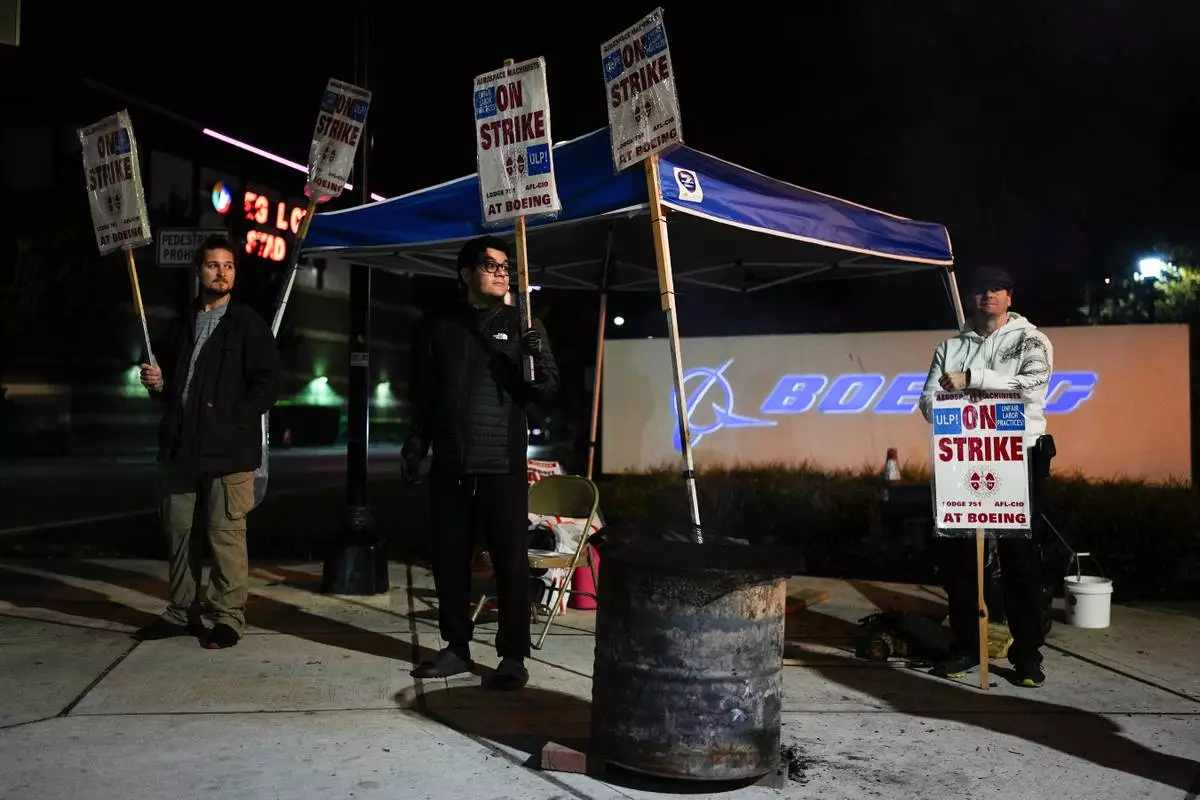
From left, Boeing employees Vance Meyring, Josue Ramirez and Joseph Mellon work the picket line after union members voted to reject a new contract offer from the company, Wednesday, Oct. 23, 2024, outside Boeing facilities in Renton, Wash. (AP Photo/Lindsey Wasson)
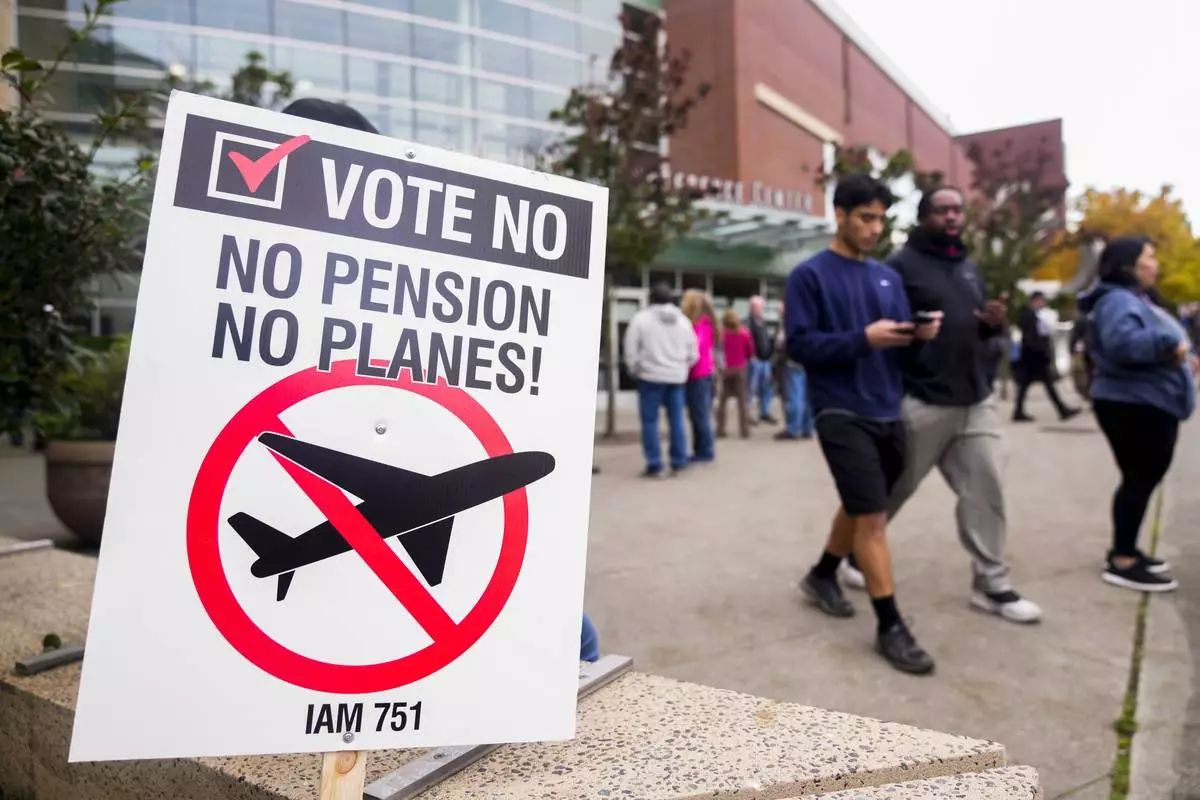
A picket sign sits outside the Angel of the Winds Arena as striking Boeing employees gather to cast their votes, Wednesday, Oct. 23, 2024, in Everett, Wash. (AP Photo/Lindsey Wasson)
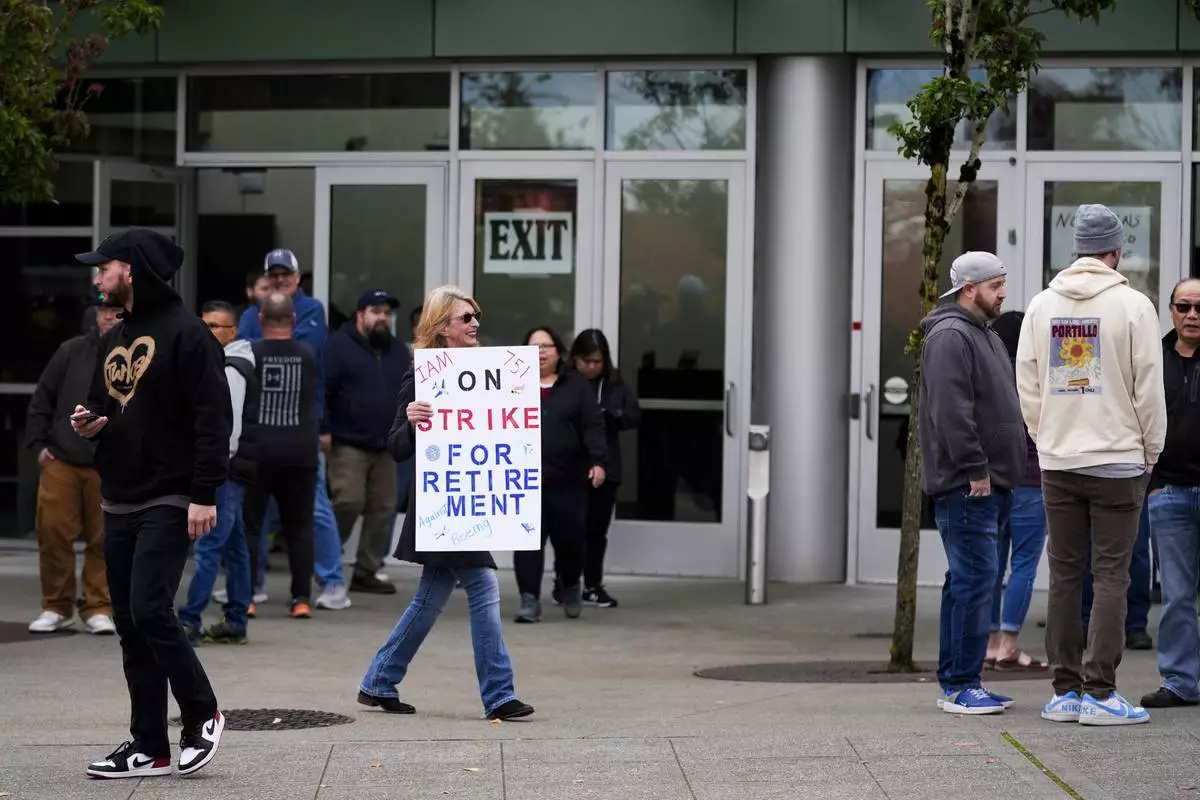
A worker holds a sign as Boeing employees vote on a new contract offer from the company, Wednesday, Oct. 23, 2024, at a voting location in the Angel of the Winds Arena in Everett, Wash. (AP Photo/Lindsey Wasson)
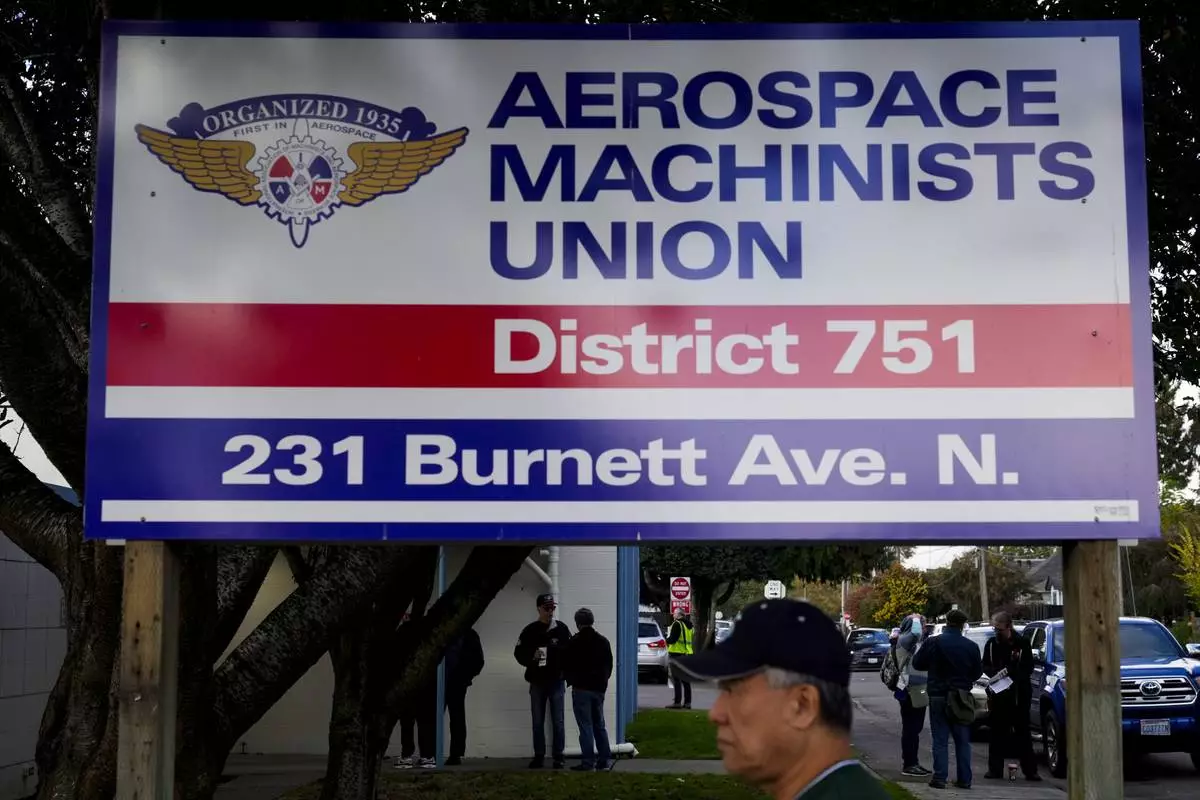
Boeing employees on strike arrive to vote on a new contract offer from the company Wednesday, Oct. 23, 2024, at the Aerospace Machinists Union hall in Renton, Wash. (AP Photo/Lindsey Wasson)
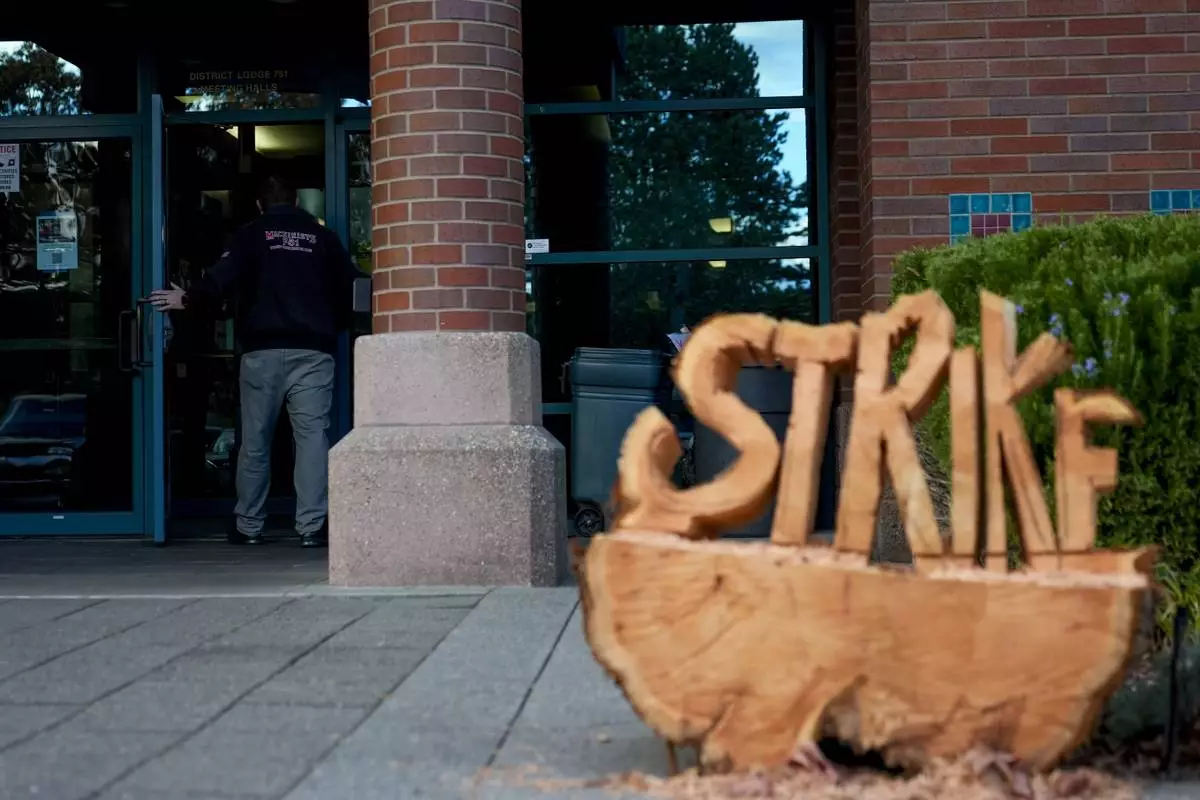
A Boeing employee walks by a sign carved out of wood while arriving to vote on a new contract offer from the company, Wednesday, Oct. 23, 2024, at Seattle Union Hall in Seattle. (AP Photo/Lindsey Wasson)

Boeing employees on strike arrive to vote on a new contract offer from the company, Wednesday, Oct. 23, 2024, at the Aerospace Machinists Union hall in Renton, Wash. (AP Photo/Lindsey Wasson)

A volunteer holds a vote to accept a new contract offer from Boeing, Wednesday, Oct. 23, 2024, at Seattle Union Hall in Seattle. (AP Photo/Lindsey Wasson)
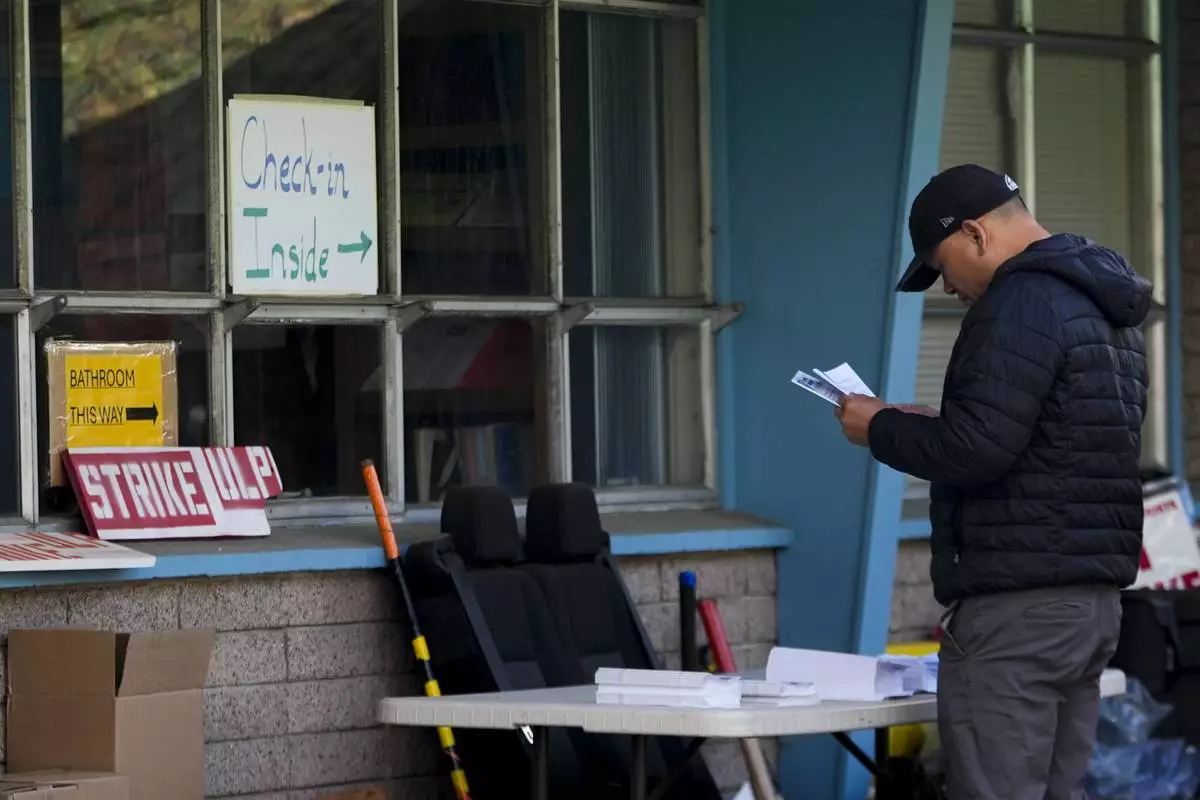
A Boeing employee looks at informational pamphlets before heading in to vote on a new contract offer from the company, Wednesday, Oct. 23, 2024, at the Aerospace Machinists Union hall in Renton, Wash. (AP Photo/Lindsey Wasson)




